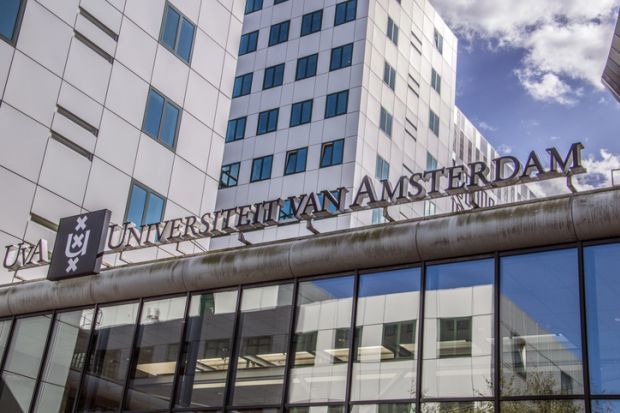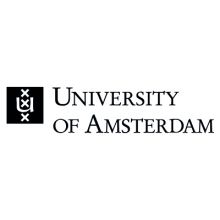Pro-Palestinian protests have been broken up by police at universities in the German and Dutch capitals, in scenes reminiscent of those currently gripping US campuses.
At the Free University of Berlin, several hundred protesters occupied a courtyard on 7 May, as the Associated Press reported, setting up tents and forming a human chain. After the demonstrators “tried to enter university and lecture halls…with the intention of occupying them” and “refused to negotiate in writing”, the university said, the institution “informed the police and ordered an evacuation of the camp”.
Following police instructions to disperse, some students were carried away amid “scuffles” between protesters and law enforcement, the AP reported, while police also used pepper spray. In a statement, Günter Ziegler, the university’s president, said: “This kind of protest is not dialogue oriented. An occupation of university property is not acceptable. We welcome academic debate and dialogue – but not in this form.”
At the University of Amsterdam (UvA), protesters established an encampment on the institution’s Roeterseiland campus on 6 May. In a statement posted on its website, the university’s executive board said police had broken up the demonstration in the early hours of 7 May after an “unsafe and grim situation” developed, involving “fireworks thrown, people being hit, the Israeli flag being burned and barricades erected”.
“We deeply regret that it had to turn out this way,” UvA said. “Demonstrating is allowed at the UvA, but without face coverings, blockades, overnight stays or an atmosphere of intimidation.” Some 169 people were arrested, police said on social media, while two remain in custody suspected of “public violence”.
The Amsterdam students’ union ASVA described the shutdown of the protest as “an example of disproportionate violence by the UvA against its own students”, in a statement posted online. Several students had been injured as a result of “excessive police violence”, ASVA said, including the union’s president.
“The right to demonstrate is a fundamental right that must be protected at all costs,” Ilona Polle, ASVA’s vice-president, said. “This eviction was not only an attack on the integrity and safety of Amsterdam students, but also a violation of their democratic rights.”
Elisa Weehuizen, president of nationwide Dutch students’ union LSVb, said: “The way universities deal with protests is often ad hoc, and the police deployment sometimes seems exaggerated. I was personally present on Roeterseiland, where most of the day passed peacefully and people took good care of each other. The escalation started with the deployment of the riot police.”
The education minister, Robbert Dijkgraaf, wrote on social media that universities were “places for debate and dialogue”, while dissent must be expressed in a manner that is “safe for everyone”. He added: “Sad to see that police intervention at [UvA] was necessary to ensure safety.”
In Ireland, meanwhile, Trinity College Dublin implied that it would not involve police in ongoing demonstrations on its campus, in a statement that seemed to reference the turmoil on US campuses. “In view of the disproportionate response we have seen at some institutions overseas, Trinity is committed to addressing the issue of the encampment as an internal process,” the university said on 6 May.
Last week, after a series of protests outside the Book of Kells exhibition concerning Gaza, increased accommodation costs and proposed fee rises, Trinity issued a fine of €214,285 (£184,237) to its primary students’ union, citing “loss of income” from the tourist attraction. Subsequently, students established an encampment on Fellows Square, while others used benches to block the entrance to the Book of Kells event.
On Monday, Trinity College Dublin Student Union (TCDSU) welcomed a “partial victory” after student representatives met with university management. In a statement posted online, the university said: “We fully understand the driving force behind the encampment on our campus and we are in solidarity with the students in our horror at what is happening in Gaza. We abhor and condemn all violence and war, including the atrocities of 7 October and the continuing ferocious and disproportionate onslaught in Gaza.”
Trinity said it had “initiated a process to divest from investments in companies that have activities in the Occupied Palestinian Territory and appear on the UN Blacklist in this regard”, and would establish a task force “to discuss how we continue to preserve academic freedom while understanding better how we engage – or not – with states that are in contravention of human rights”. The university would also waive fees and provide accommodation for six postgraduate and two undergraduate students from Gaza, it said.
TCDSU said the encampment would continue until its demands were met “in full”, including “the retroactive amnesty of students involved in protest on campus” as well as the retraction of the fine.
Register to continue
Why register?
- Registration is free and only takes a moment
- Once registered, you can read 3 articles a month
- Sign up for our newsletter
Subscribe
Or subscribe for unlimited access to:
- Unlimited access to news, views, insights & reviews
- Digital editions
- Digital access to THE’s university and college rankings analysis
Already registered or a current subscriber? Login












